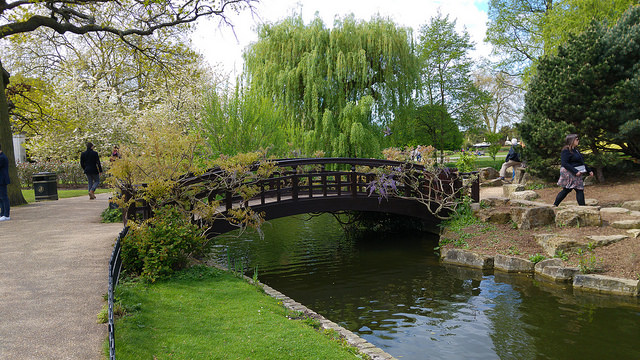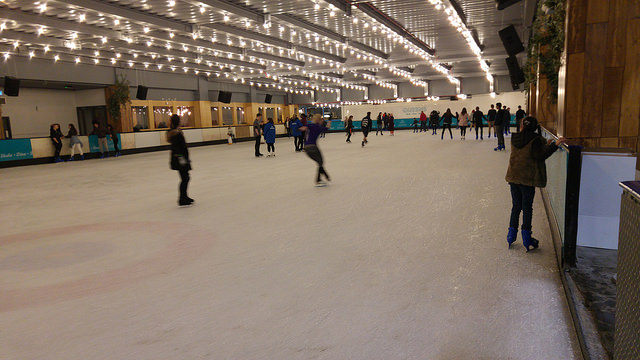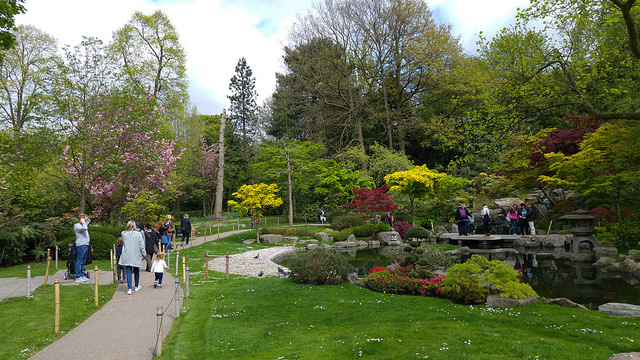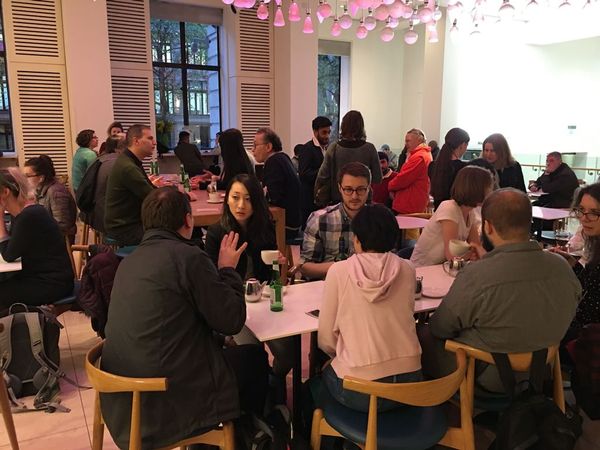
Here’s a recording of part of a song in a mystery language.
Can you identify the language, and do you know where it’s spoken?

Here’s a recording of part of a song in a mystery language.
Can you identify the language, and do you know where it’s spoken?

Today I had a nice walk and lunch in Regent’s Park (see above), then went ice skating in Queensway (pictured below).

The skating went well for the first hour or so. Then I fell awkwardly and dislocated and fractured my ankle. The staff at the ice rink helped me off the ice and called an ambulance. It came quickly and took me to the nearby Sy Mary’s Hospital.
They have straightened the ankle and put a temporary cast on it, but I will need an operation to fix it properly. I just saw one of the orthopedic surgeons who recomended that I return to Bangor and have the operation there. They are arranging that now.
Everyone had been wonderfully helpful and nice, and I haven’t had to wait nearly as long as the last time I was in hospital. That time it was my wrist that I fractured while roller blading.
I’m not sure when I’ll get back to Bangor, and it won’t be an easy journey as my anke hurts a lot if I try to move it.
Yesterday I had a good time in London with a Russian-speaking friend. We talked mainly in English with a sprinkling of Russian from time to time. In the morning we went to the Design Museum and saw a special exhibition about Moscow, which was interesting. Then had a wander around Holland Park, which is beautiful, especially at this time of year when lots of trees are in blossom (see below).

After lunch in Hammersmith we played mini golf in Acton Park, which was great fun. Neither of us were very good, but I did manage to get one hole in one. In the evening we went tango dancing, then watched a Russian film – an interesting re-telling of the Beauty and the Beast story called Аленький цветочек (The Scarlet Flower). There were no subtitles, and my Russian isn’t yet good enough to understand much, so my friend translated for me. The Russian they use in the film is old-fashioned, and they speak in a very dramatic, almost operatic way, so it’s not easy to understand.
Сегодня я еду домой or I’m going home today (“Today I go/travel homeward”). The word домой [dɐˈmoj] is one I learnt and used quite a bit yesterday. It means home, homeward or to the house, and related words/forms include:
– дом [dom] = house, home, family, household
– дома [ˈdomə] = at home (genetive singular)
– домашний [dɐˈmaʂnʲɪj] = home, household, house; private; domestic, family; home-made, homespun
– домовой [dəmɐˈvoj] = house; a house spirit or sprite
– домосед [dəmɐˈsʲet] = stay-at-home, homebody
Source: Wiktionary
Last night I went to the first Languages of London meetup – it’s the same group I’ve been going to for a few months (the Polyglot Pub), but with a new name and venue, and more participants.

The meetup was supposed to take place in the Institute of Education in UCL, which is a good location in central London near Russell Square and Euston. Unfortunately they were closed for the Easter holidays, even though they had confirmed in advance that the venue would be available. So we had to find somewhere else in a hurry. Fortunately we found a good alternative in the café in the nearby Wellcome Collection.
There were more people there last night than have been at any of the Polyglot Pub meetups I’ve been to, from various countries. We chatted about languages, and other things, in a variety of languages, and generally had a good time. I had conversations in English, Welsh, French and Japanese, and spoke odd bits of Spanish and Portuguese. There were also conversations in Mandarin, Arabic, Russian, Thai and a few other languages.
These meetups happen once a month and if you’re in London for the next one. Do come along. They’re for anybody who is learning a language or two, who speaks a few languages, and/or is interested in languages.
Yesterday I did an interview on Skype with a student of linguistics in Germany who is writing a thesis about acquiring native-like pronunciation in foreign languages. I talked about the methods I used to try to do this – listening, mimicing, learning about the phonology of a language, recording my voice and comparing to native speakers, and so on.
While we were chatting, it occured to me that speaking a foreign language is somewhat like playing a musical instrument, or to singing in tune with others. It particularly resembles playing an instrument like a violin or a trombone, which require you to constantly monitor whether the notes you’re playing are in tune with each other, and with other instruments, if you’re playing in an orchestra or other group, and to make adjustments as necessary.
Your voice is your instrument, and learning to pronounce a foreign language is like tuning your instrument. It’s not something you can do once then forget – to acquire native-like pronunciation you need to do a lot of listening and make lots of little adjustments to your pronunciation. It also helps if you understand how the sounds are produced, especially ones that don’t occur in your mother tongue – studying phonetics and phonology can help.
Even if you know nothing about music, you can probably hear when an instrument or voice is very out of tune. It just sounds wrong and clashes with the other instruments / voices. Similarly if your pronunciation of a foreign language is very different from native speakers, i.e. you have a strong accent, it will sound odd to them, and they may have trouble understanding you. The closer you can get to native-like pronunciation, the easier it will be to communicate.
Do you aim for native-like pronunciation in languages you’re learning?
How to go about this?

Here’s a recording of part of a song in a mystery language.
Can you identify the language, and do you know where it’s spoken?
A useful Russian word I learnt this week is просто [ˈprɔstə], which means easily, simply or just.
Here are some examples of how it is used:
– Нам просто надо выезжать немного раньше обычного.
= We just have to leave, you know, a little earlier than usual.
– я зашёл просто повидаться = I just popped in to see you
– Уж слишком просто запихать матрас сзади.
= It’s way too easy to fit a mattress in the back.
– всё это просто недоразумение = all this is simply a misunderstanding
– Мы просто собираемся выпить = We’re just going in for a drink
– Мне просто не хочется притворяться кем-то другим.
= I just wish I didn’t have to pretend like I was someone else.
– Мне просто нужно включить свои мозги.
= I just need a minute to get my head in gear.
Just, a very useful little word, can also be translated as только [ˈtɔlʲkə], for example:
– Только все это так сложно = It’s just all so complicated
– Они только что забрали их = They just took them
– Он только что ушёл = He’s just left
– Только не сейчас = Not just now
In other contexts there are other ways to translate just:
– Как я и ожидал = Just as I expected
– Это как раз то, что надо = It’s just right
– Ровно два часа = Just two o’clock
– Я уже собрался позвонить = I was just about to phone
– Она столь же умна, как и ты = She’s just as clever as you
– Как раз когда он собрался уходить = Just as he was leaving
– Перед самым Рождеством = just before Christmas
Sources: Reverso and Reverso Context
I spent the weekend in Devon with my brother and his family. It was my nephew’s first birthday yesterday and I was there mainly to celebrate that. My journey, a long and meadering one, took me through some places with interesting names, such as Exeter, Teignmouth, Dawlish and Paignton.
As well as admiring the scenery, I started wondering about the origins of these names, and in the case of Teignmouth, how to pronounce it.
Exeter comes from the Old English Escanceaster, and is named after the River Exe, with the Old English suffix -ceaster (fortres, fortified town). So the name means “fortress on the Exe”. The Welsh name for the city, Caerwysg, means the same thing.
The River Exe gets it’s name from the Latin isca, which is what the Romans called the fort they built where Exeter is now, in 55AD. They later called it Isca Dumnoniorum (Watertown of the Dumnonii), to distinguish it from Isca (Augusta) or Caerleon in South Wales.
The Latin name isca is a modified form of a Brittonic root meaning “water” or “abounding in fish”. Other river names from the same root include Esk, Axe and Usk. I think the root referred to is the Proto-Celtic *udenskyos (water), from the Proto-Indo-European *wódr̥ (water) [source].
The Proto-Indo-European *wódr̥ is also the root of words for water in Germanic, Slavic, Baltic, and Goidelic Celitic languages. It is the root of words for wave in the Romance languages (onda, unda, onde, etc), and of an obsolete English word for wave, und, from the Middle English unde (a wave), via the Old French unde (wave).
Teignmouth is pronounced [tɪnməθ] and comes from the Old English Tengemuða (mouth of the stream) [source].
Dawlish, according to Wikipedia, comes from a Welsh river name meaning ‘black stream’. In Roman times it was known as Dolfisc (dark river or the devil’s water). According to dawlish.com, Dawlish was originally spelt Deawlisc, a Celtic (Brythonic) word meaning ‘Devil Water’, or from a word meaning “black stream”, which is cognate with Welsh du (g)lais (black stream).
Paignton [ˈpeɪntən] comes from an Anglo-Saxon name meaning Paega’s town.
In case you’re wondering, the photo is of the mill pond and River Dart in Stoke Gabriel, where my brother lives. Stoke comes from the Old English word stoc (place), which also has two two specialised meanings: (1) a religious place and (2) a secondary settlement [source], and Gabriel is a saint/angel associated with the area. The Dart apparently gets its name from a Brythonic Celtic word meaning ‘river where oak trees grow’ [source]. If you click on the photo you can see a larger version, and some of my other photos from Stoke Gabriel.

Here’s a recording in a mystery language.
Can you identify the language, and do you know where it’s spoken?